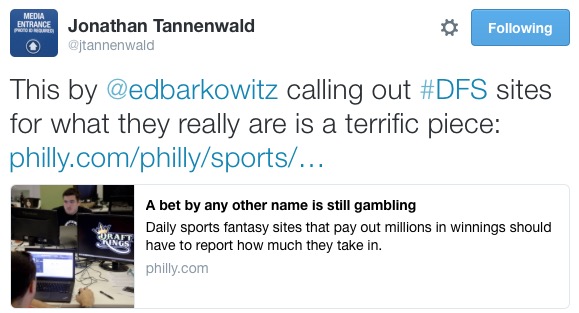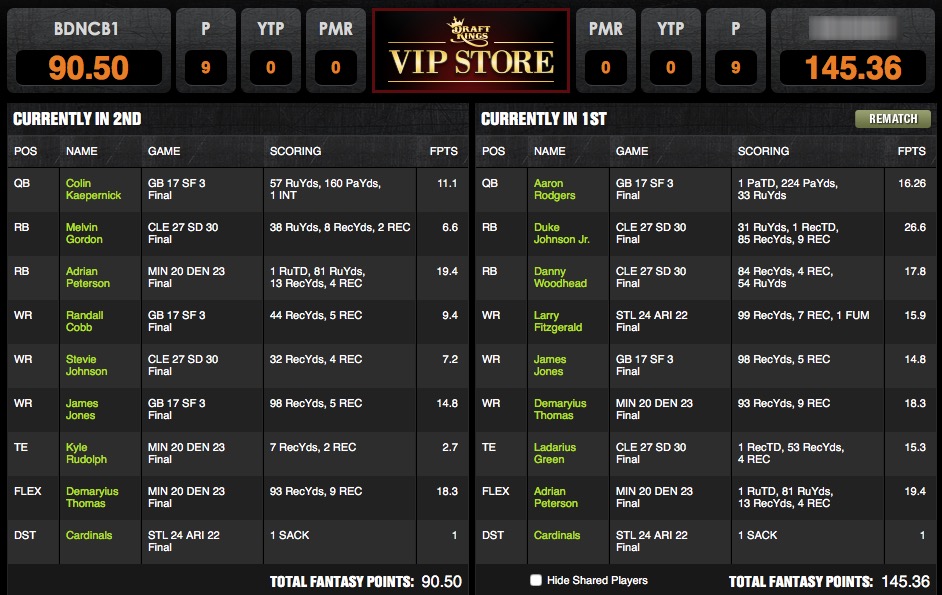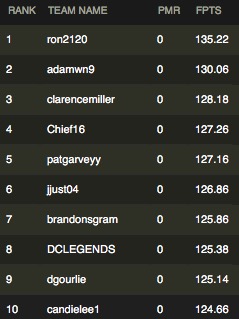Ad Disclosure
This Is A Terrible Article By Ed Barkowitz
By Kyle Scott
Published:

Ed Barkowitz wrote words.
I saw that Tweet from Philly.com’s Jonathan Tannenwald and thought, “Oh boy, Barko (can I call him that?) must’ve really went in on Draft Kings.” But nah– just words, ranting about companies making money and the concept of wagering in general.
Before I get to it: Let me say, much of the response to my post the other day was that I was blindly defending Draft Kings (and FanDuel) because Draft Kings pays me. Do they pay me? Yes. Has it been a relatively large amount these last few months? Yes. Will that continue, regardless of what I write? No. It’s cyclical. The start of football season is the biggest time of year for fantasy sports. I see little, if anything, from Draft Kings referrals in the spring and most of summer. And in my piece I didn’t intend to absolve daily fantasy sites of all wrongdoing. Even if the specific story – a Draft Kings employee using player ownership data to win on FanFuel – was inaccurate or misleading, as Draft Kings claims it was, it’s clear that a rapidly growing industry needs better compliance procedures to keep the public’s confidence, and to prevent those in privileged positions from taking advantage of customers.
But most of what’s out there about daily fantasy sports is woefully uninformed, misleading, or downright inaccurate. Fantasy sites are not defrauding customers. The potential issue is that employees may – may – have had access to information which they could’ve used on competing sites for an advantage, specifically in the big money games where owning under-the-rader, under-utilized players is necessary to have even a chance at winning. But those events represent only a subset of the total events on any given day or week. Many are much smaller, sometimes head-to-head or private leagues, where successful more traditional lineups are rewarded in more modest sums.
The problem is that the marketing pitch is the big money. So the uninformed – or non-player – just assumes that all of daily fantasy is just these crazy jackpots. Lo, Ed Barkowitz:
The guess here is that the general public quickly will forget what appears to be insider trading and get right back to playing daily fantasy sports at an alarming rate.
Remember when the Pennsylvania Daily Number was fixed? How about the 1919 World Series? Or the point-shaving scandals that have littered college basketball throughout the years? And where have you gone, Tim Donaghy?
Yes, what’s the point? People still play the lottery. People still watch baseball (sometimes). People still watch college basketball. People still watch the NBA. People still own stocks, mutual funds, and have 401ks, Roth IRAs, and similar money market plays (fucking poet). The presence of potential cheating is not good, certainly, but nothing about daily fantasy contests was or is fixed. What happened wasn’t even really insider trading. The issue is that there were employees possibly using inside information to gain an advantage, which hardly would’ve guaranteed victory the way knowing a huge earnings beat was coming from Company X would nearly guarantee stock market success. The mere fact that someone may have gained an unfair advantage doesn’t damn the entire industry– it just shows that some sort of oversight is needed, which is often the case in exponentially growing verticals. This isn’t unique to daily fantasy. It also applies to websites, apps, mobile devices, fucking organic food. Everything, pretty much.
But regulation is coming, whether or not DraftKings and FanDuel like it. It could range from something as simple as government monitoring to daily fantasy games being classified as sports betting, which is the way the sportsbooks in Vegas are rooting. This would bring much more stringent standards.
As Stan would say, “It’s a disaster.”
Ironically, this whole thing proved that daily fantasy actually does require skill, or, if you’d prefer, knowledge. Depending on your definition of gambling, that’s probably enough. But as we discussed with Scott O’Neil on the podcast last year, online sports gambling will likely be legalized, and that will go a long way in resolving many of the issues that have been raised here.
Since we’re making rules, there is one nuance I wouldn’t mind seeing implemented nationally.
In order for a contest – any contest – to boast how much money it gives out, it is required to reveal how much it has taken in.
The notion of fast money is as old as the apple shared by Adam and Eve, except it’s more intoxicating and often just as destructive.
Whether it’s the Powerball billboard on I-95 or DraftKings’ pledging a million-dollar winner every week, or some AC casino touting that it has the loosest slots, don’t just tell people how much money they’re missing out on. Tell ’em how much they’re squandering.
Dumb, Ed. Dumb. You have a calculator on your phone? There’s an easy way to figure this out. Take this contest, which I played in a couple of weeks ago (I finished 220 out of 383 and didn’t win any money):
There were 383 spots in the contest. It was $3 to enter. There was a $1,000 total prize pool.
Siri?
$149. Draft Kings made $149 hosting this contest. They are a business and made money– SHAME ON THEM!
I agree that daily fantasy marketing sometimes focuses too much on the big money events and not the more practical (and fun) smaller games. It’s understandable, but it also leaves outsiders thinking the whole thing is a giant lottery ticket, which is not the case.
Last week, I played a 4 p.m.-only league with my friend (so I wouldn’t be distracted during the Eagles game earlier). He killed me, earning 145 points with just four games going on:
I know for a fact he picked his team in under 10 minutes, as our decision to play was a very last-minute one. I entered my same team into a $5, 40-person league, with a $180 prize pool and the winner receiving $50. Needless to say, my 90 points didn’t fare well:
But had my buddy entered that same league (he didn’t), he would’ve won by 10 points, with a team he put together in 10 minutes. $50, on a $5 league. No expertise or inside information needed. The point is: Can you win $1 million? Yes. Are your chances good? No, of course not. You’re going up against very big fish, skilled players, and people who’ve put together their own proprietary algorithms. But can you win $50 or $100 or $500 with a relatively small investment in a smaller league, just by picking a good fantasy team? Yep.
As a dealer in Vegas once told me, the quickest way to double your money while gambling is to fold it in half and put it back in your pocket.
Or, just challenge me – BDNCB1 – in a $5 head-to-head league this Sunday.
…
Draft Kings CEO Jason Robins, though perhaps not always in the best tone, has vehemently denied that the employee in question used inside information to win. But, in an interview with Fortune and with Bob Ley, he also asserted that for Draft Kings to be successful in the long-term, it needs to separate players of differing skill levels. Right now it’s easy to have everyone sign up for the big leagues even though the average Joe has virtually no shot at winning. But over the long run, players will need to feel like they can win against similarly skilled players to keep coming back. Draft Kings and FanDuel know this. Their businesses won’t succeed if people just lose $20 every week on a big money league. That’s no fun.
Today, Robins sent out the following email detailing those points:
As the three co-founders of DraftKings, we want to speak to you directly about what has been going on.
We know that you play DraftKings because it’s fun and because it gives you a chance to showcase your skills against millions of other fans, and we know that you cannot do that without a level playing field.
The fairness and integrity of our contests has been at the heart of everything we have built since we started the company three and a half years ago.
Over the past week, questions have arisen around an employee of ours who won a significant prize on a competitor’s site. While our internal investigation has reflected absolutely no wrongdoing on his part, this has still pushed us to reevaluate our processes.
Long before this happened, the wheels were in motion for an external review of our policies and procedures. Given the pace of our growth, we felt that an audit was critical to ensure the security of our platform, so we hired an external law firm experienced with these issues to conduct a full review.
But that is not enough. In addition to this audit, we have put in place a set of core measures that we believe are central to this process:
We expanded our existing policy prohibiting DraftKings employees from playing on our site to prohibit participation in any public daily fantasy sports contests for money.
We also will prohibit employees from any other Daily Fantasy Sports contest operator from participating in games on DraftKings.
We are actively reviewing our organizational structure and will add resources to ensure compliance with all recommendations stemming from internal and external findings.
We are working with multiple third parties to strengthen all internal policies and procedures.
The events of the past week have caused us to take a broader look and to ask those both here and externally to widen the scope of their analysis of our business.We are aware that there is room for growth, regardless of the strength of our current platform. We will work tirelessly to improve all aspects of our customer experience, which is every bit as important to us as the effort we put into our product.
You will no doubt continue to hear from the media about both DraftKings and the industry. It is our prerogative to keep driving that conversation ourselves. We will work to respond to your concerns in complete transparency and to inform you of the steps we are taking to inspire your full trust.
Please know how grateful we are for the passion and loyalty you have shown DraftKings throughout our history and especially over the past week. You remain our greatest priority.
Thank you,
Jason Robins, Matt Kalish & Paul Liberman
Co-Founders, DraftKings
Way too much money at stake – and, frankly, way too good of a product – for them to not get this right.
Kyle Scott is the founder and editor of CrossingBroad.com. He has written for CBS Philly and Philly Voice, and been a panelist or contributor on NBC Sports Philly, FOX 29 and SNY TV, as well as a recurring guest on 97.5 The Fanatic, 94 WIP, 106.7 The Fan and other stations. He has more than 10 years experience running digital media properties and in online advertising and marketing.




